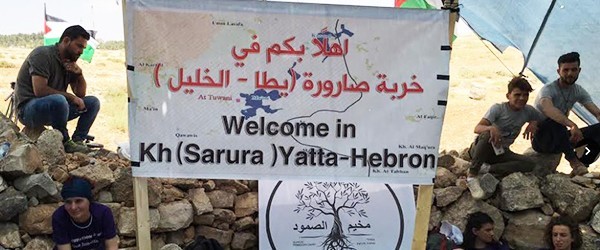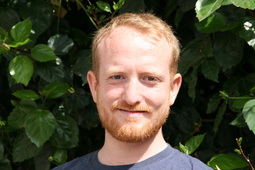Jewish Agency pulls funding from Israel experience program over West Bank activism
September 19, 2017

Following Jewish young adults’ visiting an anti-occupation protest camp that is sometimes a flashpoint for violence, the Jewish Agency dumps the program runners

The Jewish Agency will cut funding to an educational program for Jewish young adults from North America after its participants were discovered spending time this summer at an anti-occupation protest camp in the West Bank, where activists would occasionally clash with Israeli troops.
Hashomer Hatzair, the left-wing Zionist youth movement that supervised the program, was informed of the decision several days ago. A formal letter of notification was expected on Monday.
The program in question, Achvat Amim (“Solidarity of Nations”), recruits international volunteers to work with Israeli organizations dedicated to human rights and Jewish-Arab coexistence. Last month, Ad Kan, a right-wing Israeli organization that targets human rights and anti-occupation activists, published a report accusing Achvat Amim participants of provoking Israeli soldiers during visits they paid to the Sumud Freedom Camp in the South Hebron Hills this summer.
Sumud was established on the site of the former Palestinian village of Sarura by young Jewish social activists from North America and leaders of the Palestinian non-violent resistance movement. Their declared objective was to make Sarura habitable so that its cave-dwelling residents, who had been evicted decades ago, could return to their former homes. During the two months that it operated, Sumud was raided several times by Israeli troops, who would tear down the tents set up on the premises.

Ad Kan based its report largely on photos and videos posted by Achvat Amim leaders and participants on social media. The report was picked up by Channel Two news in Israel.
In their defense, the leaders of Achvat Amim said that participants visited Sumud during their free time and that these trips were not part of the official program.
Achvat Amim is one of four Hashomer Hatzair programs that receive funding through Masa, a project of the Jewish Agency aimed at bringing Diaspora Jews on extended stays to Israel. Masa runs more than 200 educational, volunteer and internship programs around the country, including West Bank settlements, and brings upwards of 12,000 young Jewish adults from overseas to Israel every year.
Achvat Amim, which was founded three years ago, had been receiving $3,000 from Masa for every participant in the five-month program. Typically, seven or eight participants are accepted to each session.

The co-founders and directors of Achvat Amim are Daniel Roth and Karen Isaacs, immigrants from Canada who were both active in Hashomer Hatzair. The two also visited Sumud this summer and were present during a clash between protestors and the Israeli army.


Speaking with Haaretz, Roth described the Ad Kan report as “false and misleading.” Contrary to its findings, he said, no participants in the program ever engaged in clashes with Israeli soldiers. Also contrary to its findings, he said, no illegal activities took place at Sumud. “We have always followed Masa’s rules,” he said. “Our aim has always been to build a future in Israel based on a just peace and to include as many Jewish voices as possible in the discourse about Zionism.”
He said that he and his co-founder planned to launch a crowd-funding campaign to allow the program to continue.

Oren Zukierkorn, the secretary-general of Hashomer Hatzair, told Haaretz he received a phone call on Thursday from Masa representatives notifying him that unless Roth and Isaacs were fired from the program, it would lose its funding from the Jewish Agency. Zukierkorn said he rejected the ultimatum.

Sara Eisen, Masa’s spokeswoman, said her organization had concluded that Roth and Isaacs had compromised the safety of program participants by allowing them to visit a place prone to violent clashes. “We love and encourage coexistence work,” she said, “but once it veers into outright political activity, it crosses a line. We felt that the program leaders acted irresponsibly.”
Zukierkorn said that an investigation by Hashomer Hatzair had concluded that none of the participants in the program were ever near the site of clashes with Israeli soldiers, and therefore, they never faced any real physical danger.
This is not the first time that Masa has withdrawn funding from its programs, Eisen said. By way of example, she noted that another program that had taken participants on a treacherous hike during terrible weather conditions, jeopardizing the physical safety of its participants, had also lost the organization’s sponsorship.
Two years ago, Ezra Schwartz, an 18-year-old American participant in a yeshiva program sponsored by Masa, lost his life in a terrorist attack in the Gush Etzion bloc of settlements. He was killed in a drive-by shooting on his way to volunteering at a memorial site located in an illegal outpost. Schwartz and his friends were sent to fulfill their community service requirement in an area of the West Bank prone to terror attacks at that time. Although Masa announced that the yeshiva that sponsored the program would be investigated, no sanctions were ever taken against it.
By cutting funding to programs like Achvat Amim, warned Zukierkorn, Israel risked losing the battle for the hearts of young left-wing Jews in the Diaspora who still identified as Zionists.
“We face a big challenge these days as a left-wing Zionist organization trying to convince young Jews abroad that it is possible to oppose the occupation and at the same time support Israel,” he said. “If it weren’t for programs like this that target left-wing Jews, these kids would be pushed straight into the hands of the BDS [Boycott, Divestment, Sanctions] movement. That is why it is so important to let them feel that the Zionist family is big enough to include everyone.”
At the same time, Zukierkorn said he thought the program leaders made a bad judgment call by letting participants visit Sumud, even if it was during their free time. “Free time or not, they knew there was a good chance that confrontations could erupt there, so by not trying to stop these participants, they were essentially giving their consent for them to go,” he said.
Still, Zukierkorn said, he did not believe the bad call should have cost them their jobs. “After all, this was not a crime, and they already promised Masa that in the future, such mistakes would not be repeated. Masa didn’t want to give them a second chance, though.”


